1999 年 1 月英语四级真题及答案
Part I Listening Comprehension (20 minutes)
Section A
Directions: Inthissection,youwillhear10shortconversations.Attheendofeach
conversation, a question will be asked about what was said. Both the
conversationandthequestionwillbespokenonlyonce.Aftereachquestion
therewillbeapause.Duringthepause,youmustreadthefourchoicesmarked
A), B), C) and D), and decide which is the best answer. Then mark the
corresponding letter on the Answer Sheet with a single line through the
center.
Example:
You will hear:
You will read:
A) 2 hours.
B) 3 hours.
C) 4 hours.
D) 5 hours.
From the conversation we know that the two were talking about some work they will
start at 9 o’clock in the morning and have to finish at 2 in the afternoon. Therefore,
D) “5 hours” is the correct answer. You should choose [D] on the Answer Sheet and
mark it with a single line through the center.
Sample Answer [A] [B] [C] [D]
1.
A) He watched television with his friend.
B) He stayed at home talking with his friend.
C) He went to see a film with his friend.
D) He went to see his schoolmate.
2.
A) When the meeting is to be held.
B) Who are going to attend the meeting.
C) Where the meeting is to be held.
D) What’s to be discussed at the meeting.
3.
A) The necessity of writing to Mr. Johnson.
B) Who is going to contact Mr. Johnson.
C) The arrangement of the Wednesday meeting.
�
D) Where they are going to meet Mr. Johnson.
4.
A) Jack brought the tape to the party.
B) The tape had been returned to Paul.
C) The tape was missing.
D) Jack lent his tape to Paul.
5.
A) The man wants to reserve a room.
B) The man reserved a room some time ago.
C) The man has booked a room with no bath.
D) The man wants to buy a flat on the second floor.
6.
A) Both editions are the same price now.
B) It has two editions with the same cover.
C) The paperback edition is on sale.
D) The hardcover edition is more expensive.
7.
A) His TV sets are all of the same brand.
B) He doesn’t have the newest models right now.
C) He has the best TV sets for sale.
D) His TV sets have a good sale.
8.
A) He must hand in a report about the museum.
B) He has already visited the museum.
C) He has to read a history book.
D) He is too busy to go with her.
9.
A) They are rewarding.
B) They are entertaining.
C) They are boring.
D) They are time-consuming.
10. A) A sunny day.
B) A raincoat.
C) An attractive hut.
D) A lovely hat.
Section B
Directions: Inthissection,youwillhear3shortpassages.Attheendofeachpassage,
�
you will hear some questions. Both the passage and the questions will be
spokenonlyonce.Afteryouhearaquestion,youmustchoosethebestanswer
fromthefourchoicesmarkedA),B),C)andD).Thenmarkthecorresponding
letter on the Answer Sheet with a single line through the center.
Questions 11 to 14 are based on the passage you have just heard.
Passage one
11. A) She sat back and relaxed.
B) She decided to retire.
C) She entered university.
D) She worked out a new English program.
12. A) 8 years.
B) 20 years.
C) 16 years.
D) 30 years.
13. A) Bring a great deal of useful experience to the university.
B) Improve human relationships in the university.
C) Bring a fear of aging among young students on the campus.
D) Improve the reputation of the university.
14. A) She is learning English and Drama.
B) She is learning how to make sound judgments.
C) She is learning how to teach minority students.
D) She is learning to perceive, not to judge.
Questions 15 to 17 are based on the passage you have just heard.
Passage Two
15. A) The difference between classical music and rock music.
B) Why classical music is popular with math students.
C) The effects of music on the results of math tests.
D) How to improve your reasoning ability.
16. A) Because it stimulates your nerve activity.
B) Because it keeps you calm.
C) Because it strengthens your memory.
�
D) Because it improves your problem solving strategies.
17. A) Piano music could interfere with your reasoning ability.
B) The effects of music do not last long.
C) The more you listen to music, the higher your test scores will be.
D) Music, whether classical or rock, helps improve your memory.
Questions 18 to 20 are based on the passage you have just heard.
Passage Three
18. A) To drive the car automatically.
B) To measure the driver’s pulse.
C) To prevent car accidents.
D) To monitor the driver’s health.
19. A) It sends out signals for help.
B) It sounds an alarm to warn the driver.
C) It takes over the driving immediately.
D) It stops the car automatically.
20. A) It monitors the signals transmitted from the driver’s brain.
B) It can measure the driver’s alcohol level in the blood.
C) It can quicken the driver’s response to emergencies.
D) It bases its analysis on the driver’s heartbeat.
Part II Reading Comprehension (35 minutes)
Directions: There are 4 passages in this part. Each passage is followed by some
questionsorunfinishedstatements.Foreachofthemtherearefourchoices
markedA),B),C)andD).Youshoulddecideonthebestchoiceandmarkthe
corresponding letter on the Answer Sheet with a single line through the
center.
Passage One
Questions 21 to 25 are based on the following passage.
The view over a valley of a tiny village with thatched(草盖的) roof cottages around
a church; a drive through a narrow village street lines with thatched cottages painted
pink or white; the sight in parts of England. Most people will agree that the thatched
roof is an essential part of the attraction of the English countryside.
Thatching is in fact the oldest of all the building crafts practiced in the British
�
Isles(英论诸岛). Although thatch has always been used for cottage and farm buildings,
it was once used for castles and churches, too.
Thatching is a solitary (独自的) craft, which often runs in families. The craft
of thatching as it is practiced toady has changed very little since the Middle Ages.
Over 800 full-time thatchers are employed in England and Wales today, maintaining and
renewing the old roofs as well as thatching newer houses. Many property owners choose
thatch not only for its beauty but because they know it will keep them cool in summer
and warm in winter.
In fact, if we look at developing countries, over half the world lives under thatch,
but they all do it in different ways. People in developing countries are often reluctant
to go back to traditional materials and would prefer modern buildings. However, they
may lack the money to allow them to import the necessary materials. Their temporary
mud huts with thatched roofs of wild grasses often only last six months. Thatch which
has been done the British way lasts from twenty to sixty years, and is an effective
defiance against the heat.
21. Which of the following remains a unique feature of the English countryside?
A) Narrow streets lined with pink or white houses.
B) Rolling hills with pretty farm buildings.
C) Cottages with thatched roofs.
D) Churches with cottages around them.
22. What do we know about thatching as a craft?
A) It is a collective activity.
B) It is practised on farms all over England.
C) It is quite different from what it used to be.
D) It is in most cases handed down among family members.
23. Thatched houses are still preferred because of ________.
A) their style and comfort
B) their durability
C) their easy maintenance
D) their cheap and ready-made materials
24. People in developing countries also live under thatch because ________.
A) thatched cottages are a big tourist attraction
B) thatched roof houses are the cheapest
C) thatch is an effective defense against the heat
D) they like thatched houses better than other buildings
�
25. We can learn from the passage that ________.
A) thatched cottages in England have been passed down from ancient times
B) thatching is a building craft first created by the English people
C) the English people have a special liking for thatched houses
D) most thatched cottages in England are located on hillsides
Passage Two
Questions 26 to 30 are based on the following passage.
President Coolidge’s statement, “The business of America is business,” still
points to an important truth today-that business institutions have more prestige (威
望) in American society than any other kind of organization, including the government.
Why do business institutions posses this great prestige?
One reason is that Americans view business as being more firmly based on the ideal
of competition than other institutions in society. Since competition is seen as the
major source of progress and prosperity by most Americans, competitive business
institutions are respected. Competition is not only good in itself, it is the means
by which other basic American values such as individual freedom, equality of opportunity,
and hard work are protected.
Competition protects the freedom of the individual by ensuring that there is no
monopoly(垄断) of power. In contrast to one, all-powerful government, many businesses
compete against each other for profits. Theoretically, if one business tries to take
unfair advantage of its customers, it will lose to competing business which treats its
customers more fairly. Where many businesses compete for the customers’ dollar, they
cannot afford to treat them like inferiors or slaves.
A contrast is often made between business, which is competitive, and government,
which si a monopoly. Because business is competitive, many Americans believe that it
is more supportive of freedom than government, even though government leaders are
elected by the people and business leaders are not. Many Americans believe, then, that
competition is as important, or even more important, that democracy in preserving
freedom.
Competition in business is also believed to strengthen the ideal of equality of
opportunity. Competition is seen as an open and fair race where success goes to the
swiftest person regardless of his or her social class background. Competitive success
is commonly seen as the American alternative to social rank based on family background.
Business is therefore viewed as an expression of the idea of equality of opportunity
rather than the aristocratic (贵族的) idea of inherited privilege.
26. The statement “The business of America is business” probably means “________”.
A) The business institutions in America are concerned with commerce
B) Business problems are of great importance to the American government
C) Business is of primary concern to Americans
�
D) America is a great power in world business
27. Americans believe that they can realize their personal values only ________.
A) when given equality of opportunity
B) through doing business
C) by protecting their individual freedom
D) by way of competition
28. Who can benefit from business competition?
A) Honest businessmen.
B) Both businessmen and their customers.
C) People with ideals of equality and freedom.
D) Both business institutions and government.
29. Government is believed to differ strikingly from business in that government is
characterized by ________.
A) its absolute control of power
B) its function in preserving personal freedom
C) its role in protecting basic American values
D) its democratic way of exercising leadership
30. It can be inferred from the passage that the author believes ________.
A) Americans are more ambitious than people in other countries
B) in many countries success often depends on one’s social status
C) American businesses are more democratic than those in other countries
D) businesses in other countries are not as competitive as those in America
Passage Three
Questions 31 to 35 are based on the following passage.
The appeal of advertising to buying motives can have both negative and positive
effects consumers may be convinced to buy a product of poor quality or high price because
of an advertisement. For example, some advertisers have appealed to people’s desire
for better fuel economy for their cars by advertising automotive products that improve
gasoline mileage. Some of the products work. Others are worthless and a waste of
consumers’ money.
Sometimes advertising is intentionally misleading. A few years ago a brand of bread
was offer to dieters (节食者) with the message that there were fewer calories (热量
单位,大卡) in every slice. It turned out that the bread was not dietetic (适合于节
食的), but just regular bread. There were fewer calories because it was sliced very
�
thin, but there were the same number of calories in every loaf.
On the positive side, emotional appeals may respond to a consumer’s real concerns.
Consider fire insurance. Fire insurance may be sold by appealing to fear of loss. But
fear of loss is the real reason for fire insurance. The security of knowing that property
is protected by insurance makes the purchase of fire insurance a worthwhile investment
for most people. If consumers consider the quality of the insurance plans as well as
the message in the ads, they will benefit from the advertising.
Each consumer must evaluate her or his own situation. Are the benefits of the product
important enough to justify buying it? Advertising is intended to appeal to consumers,
but it does not force them to buy the product. Consumers still control the final buying
decision.
31. Advertising can persuade the consumer to buy worthless products by ________.
A) stressing their high quality
B) convincing him of their low price
C) maintaining a balance between quality and price
D) appealing to his buying motives
32. The reason why the bread advertisement is misleading is that ________.
A) thin slices of bread could contain more calories
B) the loaf was cut into regular slices
C) the bread was not genuine bread
D) the total number of calories in the loaf remained the same
33. The passage tells us that ________.
A) sometimes advertisements really sell what the consumer needs
B) advertisements occasionally force consumers into buying things they don’t need
C) the buying motives of consumers are controlled by advertisements
D) fire insurance is seldom a worthwhile investment
34. It can be inferred from the passage that a smart consumer should ________.
A) think carefully about the benefits described in the advertisements
B) guard against the deceiving nature of advertisements
C) be familiar with various advertising strategies
D) avoid buying products that have strong emotional appeal
35. The passage is mainly about ________.
A) how to make a wise buying decision
B) ways to protect the interests of the consumer
�
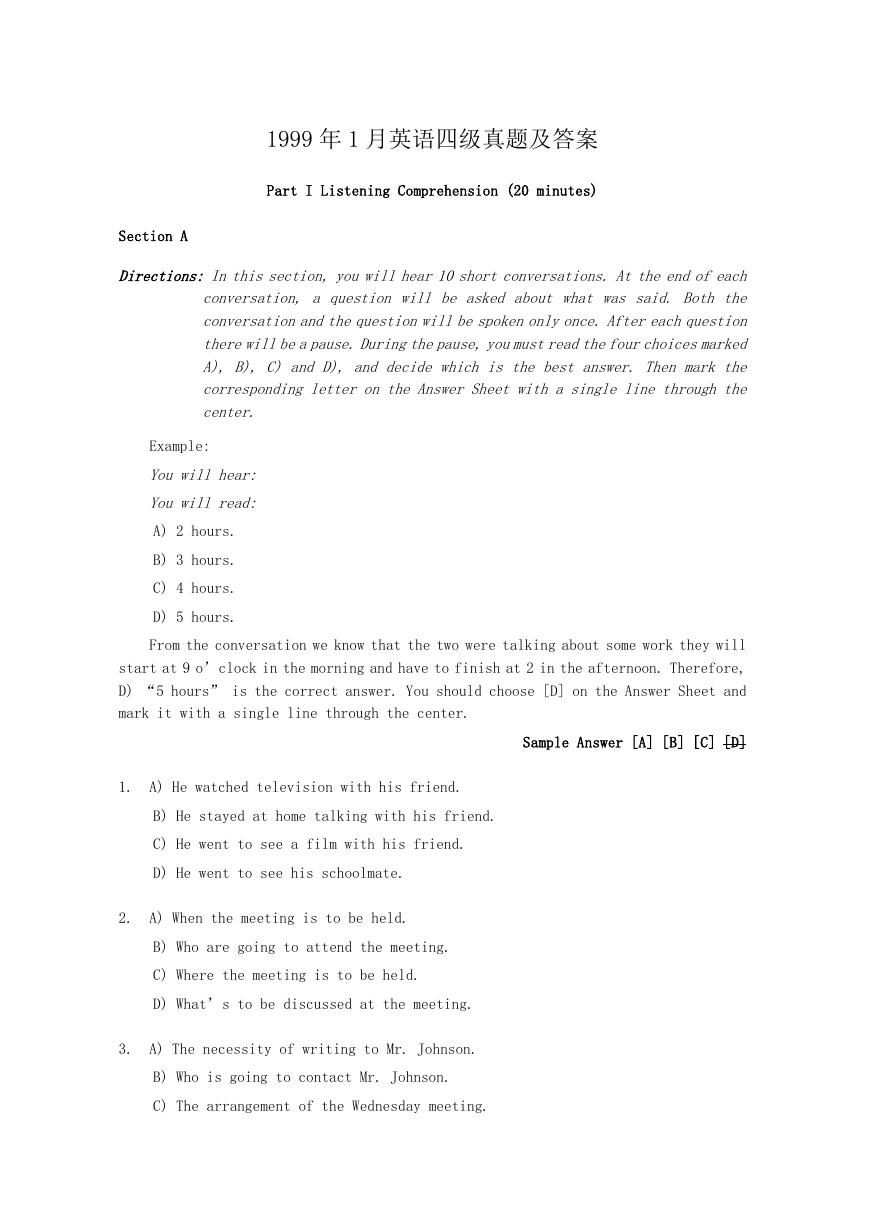
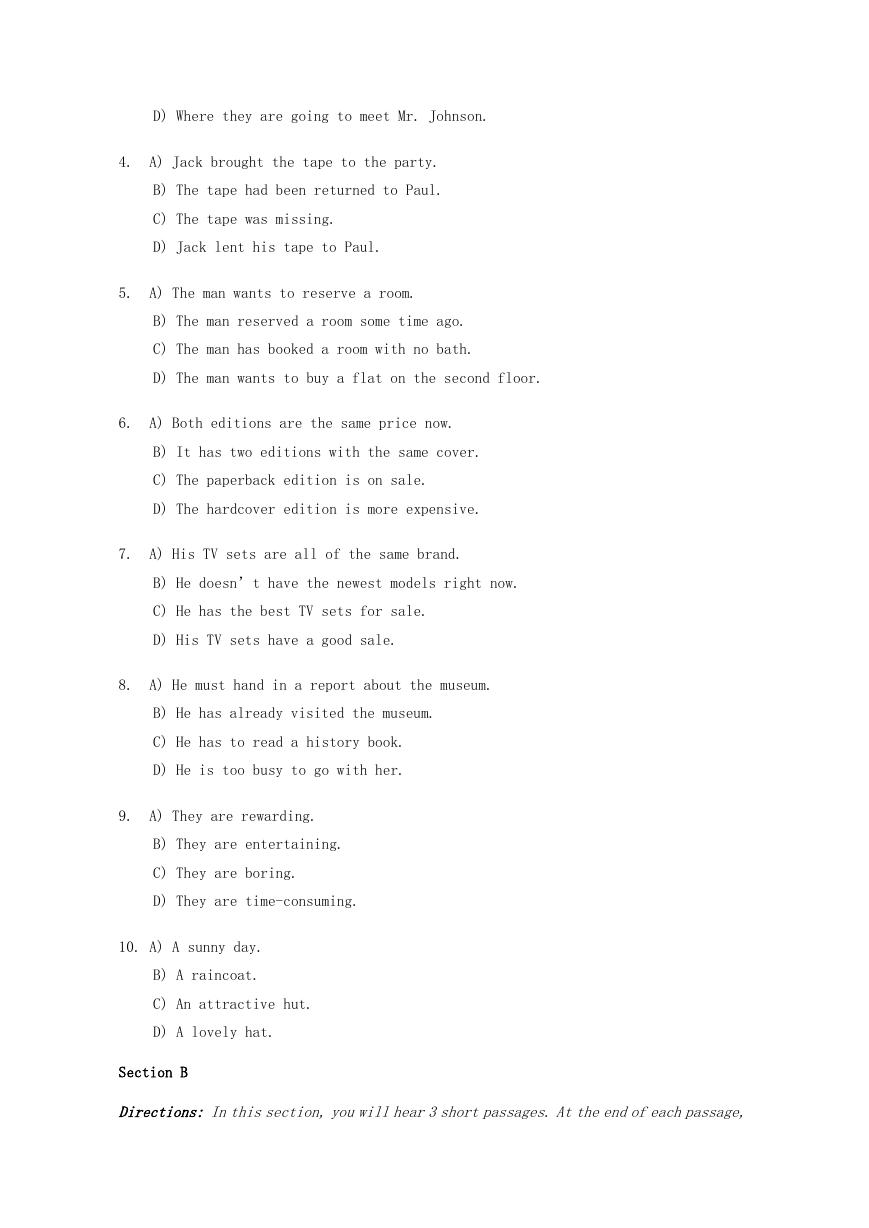
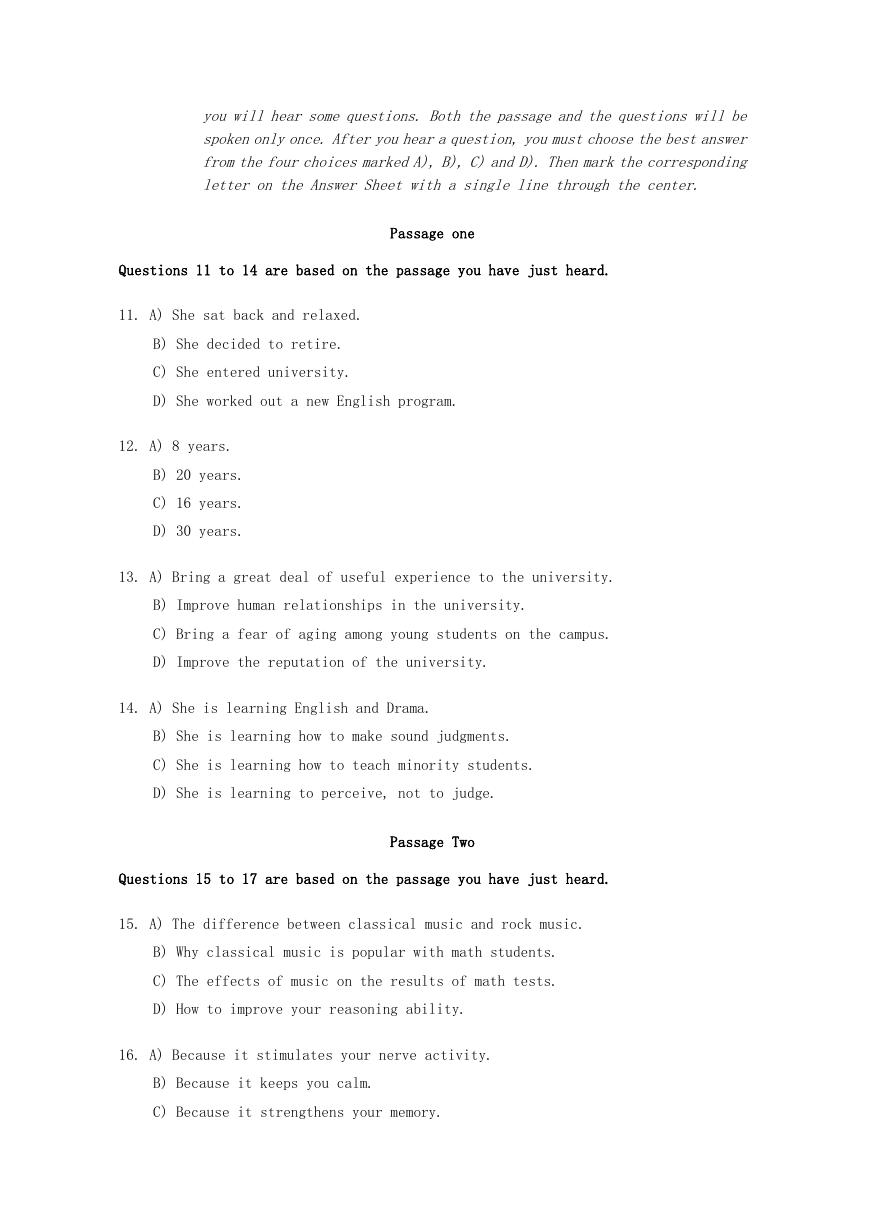
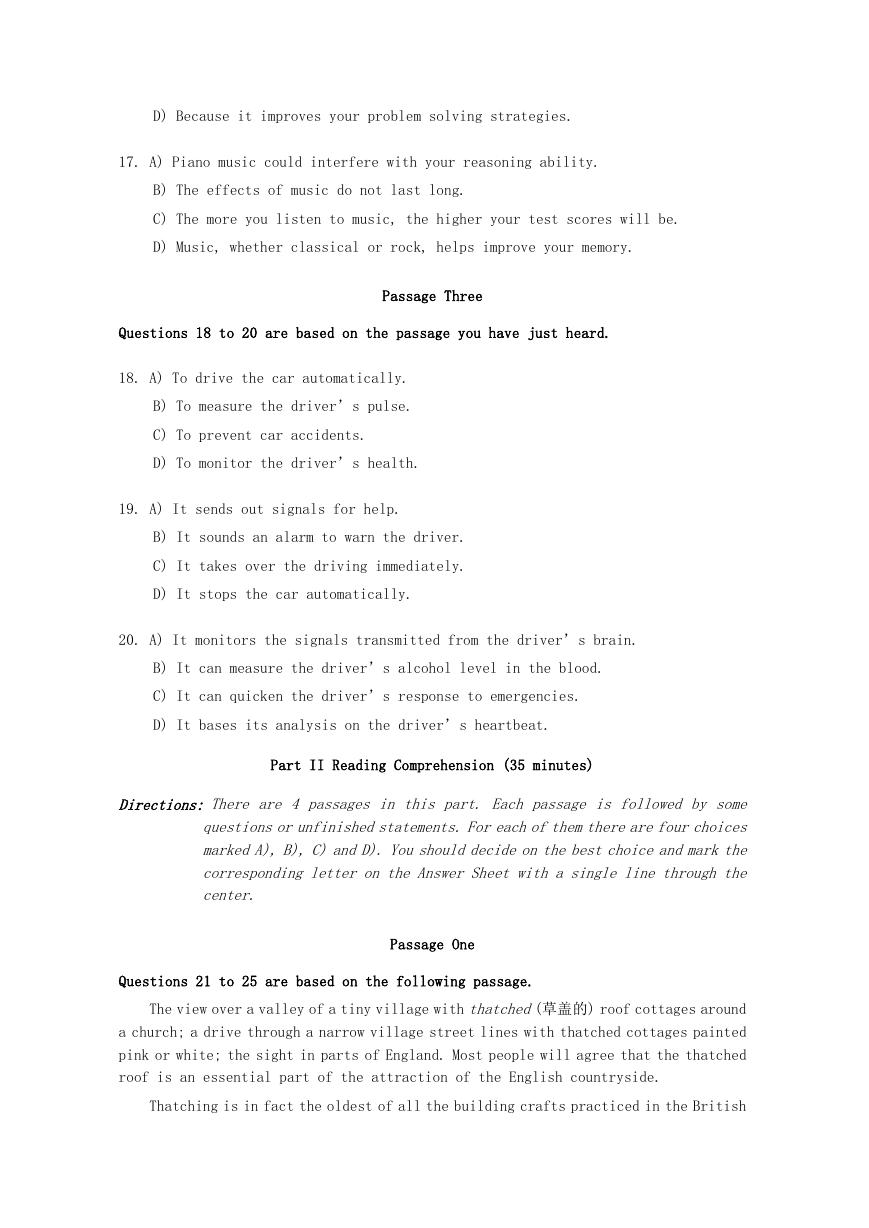
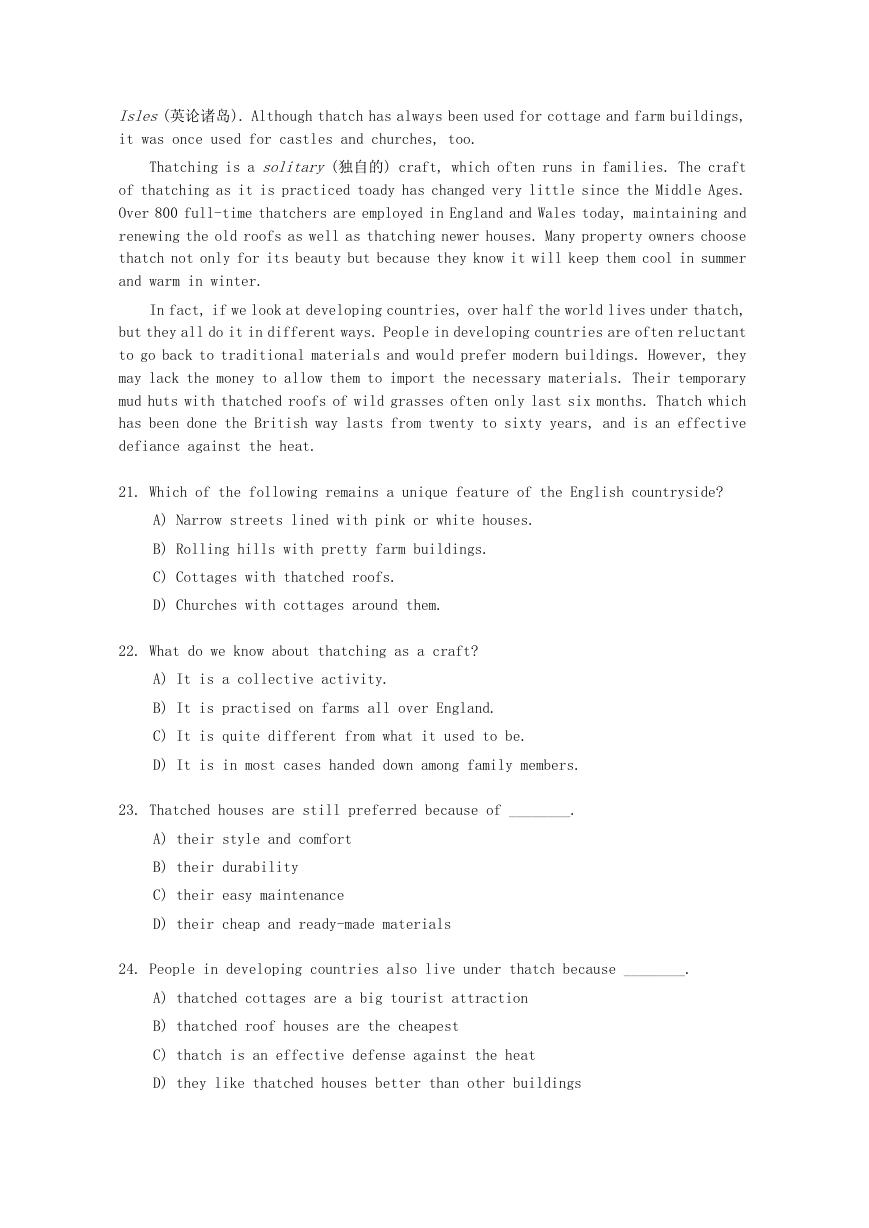
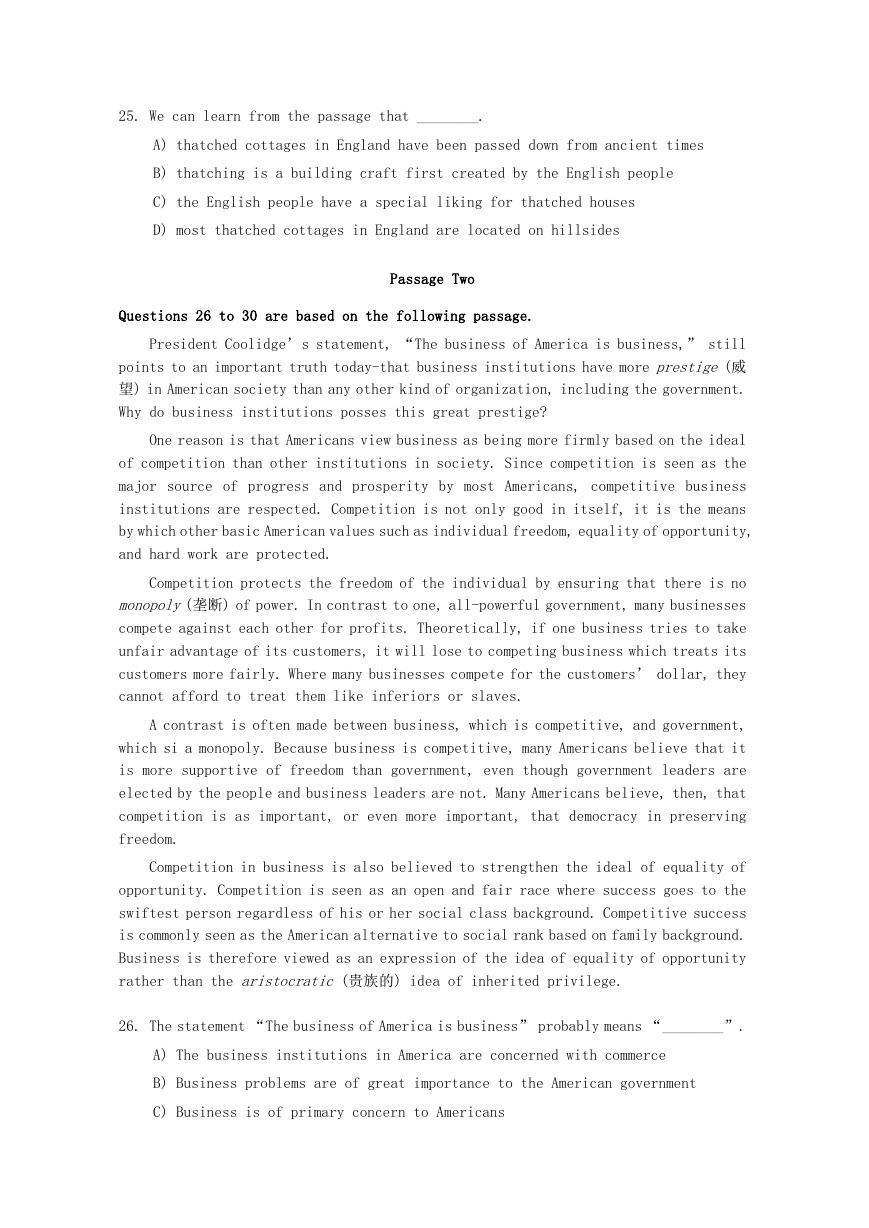
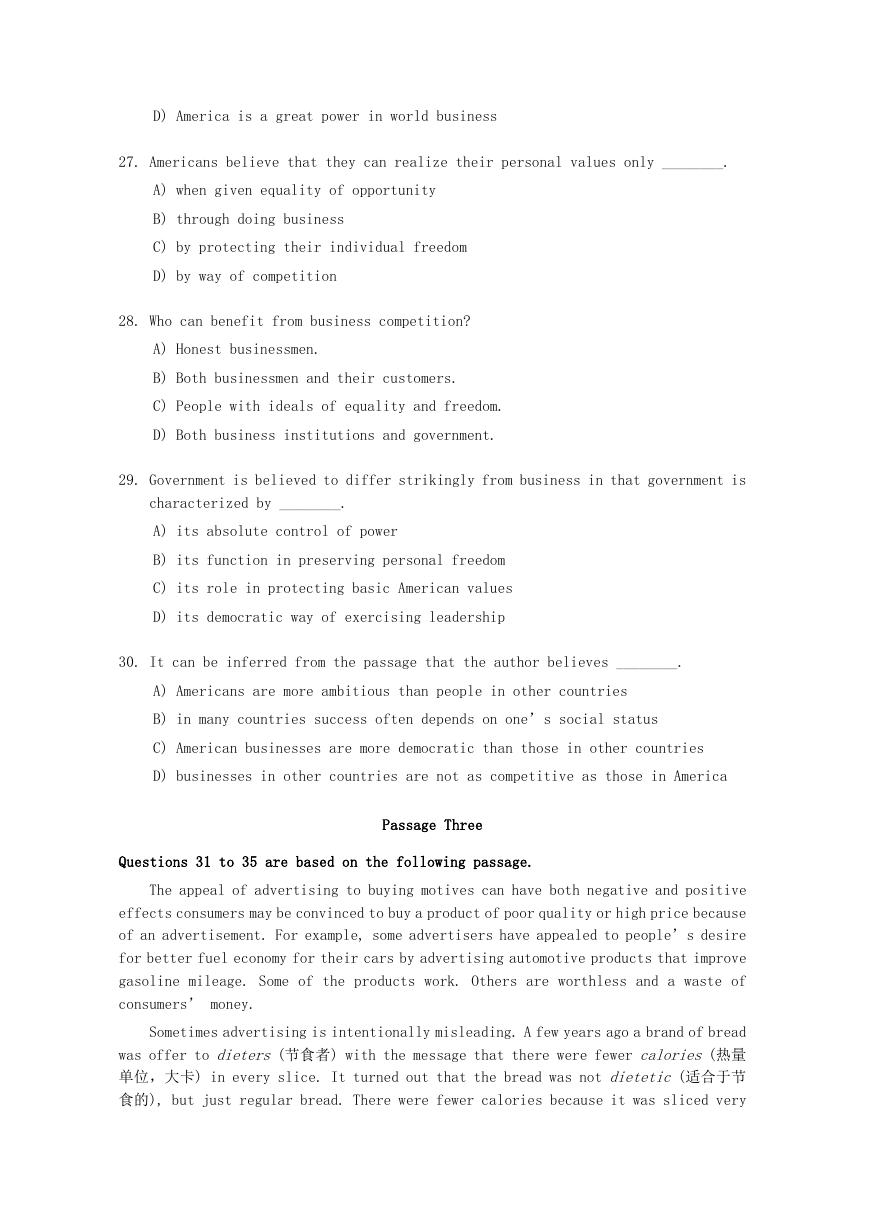
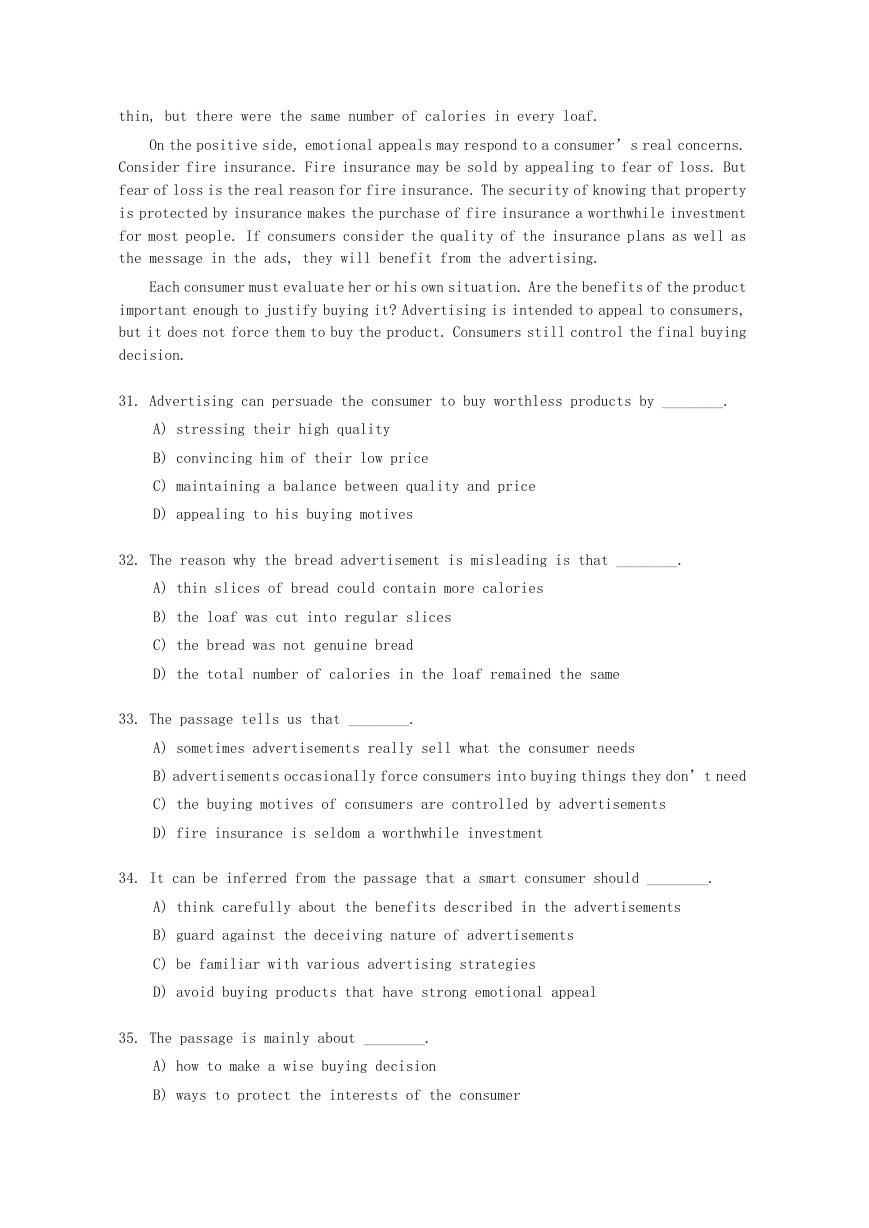








 2023年江西萍乡中考道德与法治真题及答案.doc
2023年江西萍乡中考道德与法治真题及答案.doc 2012年重庆南川中考生物真题及答案.doc
2012年重庆南川中考生物真题及答案.doc 2013年江西师范大学地理学综合及文艺理论基础考研真题.doc
2013年江西师范大学地理学综合及文艺理论基础考研真题.doc 2020年四川甘孜小升初语文真题及答案I卷.doc
2020年四川甘孜小升初语文真题及答案I卷.doc 2020年注册岩土工程师专业基础考试真题及答案.doc
2020年注册岩土工程师专业基础考试真题及答案.doc 2023-2024学年福建省厦门市九年级上学期数学月考试题及答案.doc
2023-2024学年福建省厦门市九年级上学期数学月考试题及答案.doc 2021-2022学年辽宁省沈阳市大东区九年级上学期语文期末试题及答案.doc
2021-2022学年辽宁省沈阳市大东区九年级上学期语文期末试题及答案.doc 2022-2023学年北京东城区初三第一学期物理期末试卷及答案.doc
2022-2023学年北京东城区初三第一学期物理期末试卷及答案.doc 2018上半年江西教师资格初中地理学科知识与教学能力真题及答案.doc
2018上半年江西教师资格初中地理学科知识与教学能力真题及答案.doc 2012年河北国家公务员申论考试真题及答案-省级.doc
2012年河北国家公务员申论考试真题及答案-省级.doc 2020-2021学年江苏省扬州市江都区邵樊片九年级上学期数学第一次质量检测试题及答案.doc
2020-2021学年江苏省扬州市江都区邵樊片九年级上学期数学第一次质量检测试题及答案.doc 2022下半年黑龙江教师资格证中学综合素质真题及答案.doc
2022下半年黑龙江教师资格证中学综合素质真题及答案.doc